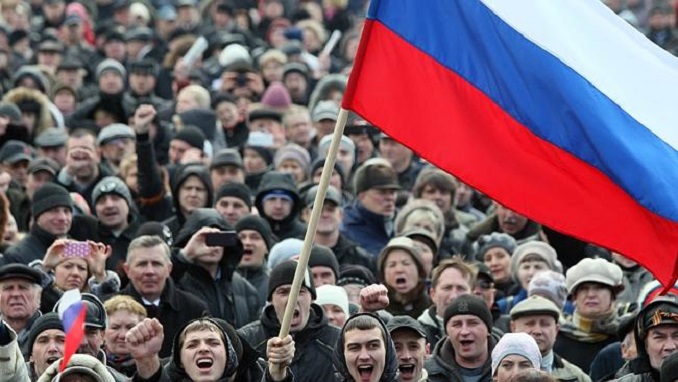Russian people have become less adverse towards the United States, the European Union, and Ukraine over the past several months, though overall negativity towards the West remains, a survey conducted by the Russian Levada Center pollster shows.
According to the survey published by the Izvestya newspaper, 52% of the respondents were negative towards the U.S., and only 26% of those interviewed were positive towards the country. A previous poll conducted in December 2017 said that this proportion was 60% to 24%, respectively.
The people surveyed noted America’s aggressive behavior on the global arena and antagonism against Russia as the main reason for their negative attitude toward the U.S. Only 9% of respondents pointed to anti-Russian sanctions as a reason.
The respondents who expressed positive attitudes towards the U.S. noted the high level of technological development along with the United States being a rich country with a strong economy and good quality of life.
The attitude of Russian people to the EU and Ukraine remains generally negative as well, the survey showed. On the other hand, 70% of the respondents said they felt positive towards China, 52% – towards Georgia, and 59% – towards Israel.
Levada researcher Denis Volkov told Izvestia that the survey’s results prove that the peak of conflict with western countries has passed.
“The conflict remains, new events add emotions, but people quickly forget about them. However, everyone understands that a sluggish confrontation is still on,” he mentioned.
Volkov added that the survey was conducted prior to the publication of the so-called ‘Kremlin List’, which is why he expects a more negative backlash in further polls. Speaking about Ukraine, Volkov said that Russians’ attitude towards the neighboring country is likely to improve.
“Fewer people are keeping an eye on the conflict. The attitude is becoming better due to the lack of serious news pegs. There is no negative agenda on the TV news,” he said.
Political consultant Dmitry Fetisov agrees that changing sentiments are connected with the current information agenda, though he expects a surge of negativity in the future due to news coming from the Winter Olympic Games in South Korea that will refocus on the doping scandal, which many think was initiated by Washington.












